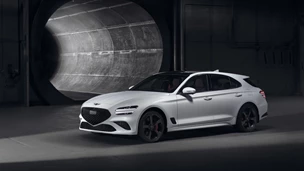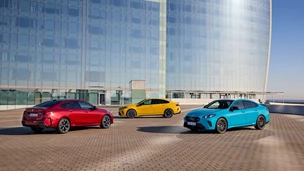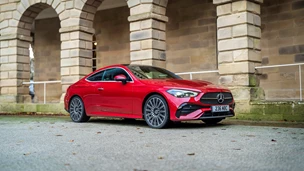I don't think Mercedes-Benz always succeeds when it drifts from its home territory of building large saloons and estates, but the R-Class MPV is an exception. In many ways it is a superb piece of work - so much so that you might image this was the sort of thing Mercedes had been building for decades. After a week with the R 320L CDI, though, I'm niggled by some of the stranger aspects of its design.It's not a car that fits comfortably into any niche. The proportions are that of a vastly extended estate car, but it's more than that. The general feel is of an MPV, but an unusually sporty one, and one with fewer seats (six) than the number you might expect it to have (seven). And it shares its platform with the M-Class SUV, but otherwise it seems to have no relation to that model, apart from the fact that it has four-wheel drive as standard.In long-wheelbase form, the R-Class is colossal. That's good news for passengers in the second and third rows, who get an enormous amount of legroom - actually a variable amount, since the seats in the middle row can be shifted forwards or backwards as required. Passengers no.5 and no.6 will have to be relatively short, though, since the sloping roofline means they have far less headroom than the others.Up front, the headroom variation is remarkable. The driver's seat is height-adjustable to such an extent that you can make yourself feel like you're conducting a coupé or a van or anything in between. Whichever you choose, it's unlikely that you will ever see any part of the car more than an inch ahead of the base of the windscreen, which is a bit of a problem because there's a large front end tucked away out of view.There are parking sensors, but all they do to begin with is switch on a series of yellow lights in the centre of the dashboard. You don't get an audible warning until the first red light appears, and by that time the front number plate is less than a foot away from the obstruction. If you're not already aware that you're within touching distance of the brick wall, the car in front or whatever it might be, this could get messy.Visibility is in general a problem with the R-Class. The front seats do not extend very far back, and if you're over six feet tall you might find yourself sitting closer to the major controls than you might wish. This also means that nobody will be able to position themselves very far from the massive windscreen pillar, which obstructs the view to such an extent that at one point I lost an entire Ford Escort in the blind spot.The central pillar is equally obstructive, so watch out when you're overtaking. But if you really want an example of how not to design a car, try looking out the back. The side window line, which slopes considerably more sharply than the roof does, combines with the small rear window to offer a pathetic amount of glass area. This is bad enough in a small hatchback, but in a vehicle as long as the R-Class it means that there is simply too much guesswork involved in any reversing manoeuvre.There is enough here to make me decide that I do not want an R-Class. But hang on. Against that I have to balance the many delights which this car offers.Not the least of them is the six-cylinder turbo diesel engine. Despite the test car's R 320 name, this is a three-litre unit; and so, just to add to the confusion, is the one in the less powerful R 280. Never mind all that. The point is that, with a maximum of 221bhp available, the diesel is more than strong enough to deal with the substantial bulk of the R-Class. It will deal with the 0-62mph drag in just under nine seconds, and it breaks the 30mpg barrier in the combined fuel economy test.It comes as standard with the 7G-TRONIC automatic gearbox. Deep in my heart I can't help feeling that a company which devises a seven-speed automatic is doing little more than showing off, but this may just be prejudice. There are so many ratios that they must inevitably be stacked close together, so any shift from one to the other will involve only a minor alteration in engine speed. The quality of the change is itself excellent, to the point where you hardly know it's happening.It's a different story if you use the buttons mounted on the invisible side of the steering wheel to operate the manual hold function. Do that, and the number of available gears can cause a slight throbbing around the temples. I tended to stick to automatic control most of the time, though the manual hold did prove useful on some of the more challenging roads near where I live.Those roads also demonstrated the most surprising of the R 320's qualities: it is quite astonishingly good to drive. The steering in particular is just wonderful, but the ride runs it a close second. The car carries its own weight beautifully, and the suspension is soft enough to absorb all the horrors of a straight but abominably surfaced road which I regularly use to expose the failings of a badly set-up chassis.Soft enough to do that, but not so soft as to make the R 320 the wallowing mess it might easily have been. On the contrary, it handles far better than might be expected of a car this size. The great length gives it stability, the four-wheel drive takes the heat off the front end when you're giving it large on the accelerator, and the excellent grip from the (very much not low-profile) Michelin tyres makes the R-Class as willing to change direction as something much smaller and more sporty would be.That was the big surprise with this car. Before it arrived, I would never have guessed that it would provide such a marvellous driving experience. The pity of it is that this isn't enough to make me forgive the terrible lack of visibility, or to forget the dangers that are associated with it. Engine 2987cc, 6 cylinders Power 221bhp Transmission 7-speed automatic Fuel/CO2 30.4mpg / 246g/km Acceleration 0-62mph: 8.8 seconds Top speed 138mph Price £40,020 Details correct at publication date

Our Rating



